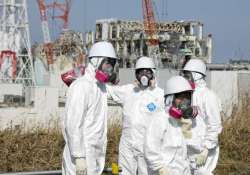Tokyo, July 20: Around 10 percent of the nearly 20,000 workers who have taken part in the clean-up of the disabled Fukushima nuclear plant were exposed to enough radiation to increase their risk of developing thyroid cancer, Japanese daily Asahi Shimbun reported.
The plant's operator, Tokyo Electric Power, or TEPCO, conducted tests of the 19,592 people who have worked at the Fukushima Daiichi facility since the March 2011 disaster.
A little more than 10 percent of the emergency workers - 1,973 people - appeared to have been exposed to a minimum of 100 millisieverts of radiation, a level considered dangerous by the International Commission on Radiological Protection.
TEPCO plans to offer those 1,973 workers the chance to undergo additional exams capable of determining the degree of internal contamination, the newspaper said Friday.
The company initially estimated that a total of 178 workers at Fukushima had radiation exposures of 100 millisieverts or more.
TEPCO announced Thursday it had detected "steam-like gas" in one of the Fukushima reactor buildings, but said no significant change in radiation levels had been observed.
A worker noticed on video camera that the steam was "wafting through the air near the central part of the fifth floor (equipment storage pool side) of Unit 3", TEPCO said in a statement.
Unit 3 was seriously damaged by a hydrogen explosion and partial meltdown in the wake of the devastating magnitude-9.0 earthquake and subsequent tsunami that struck Japan March 11, 2011.
Nearly 3,500 employees currently are working to completely dismantle the Fukushima nuclear plant, a process that could take at least 40 years.
Latest World News
